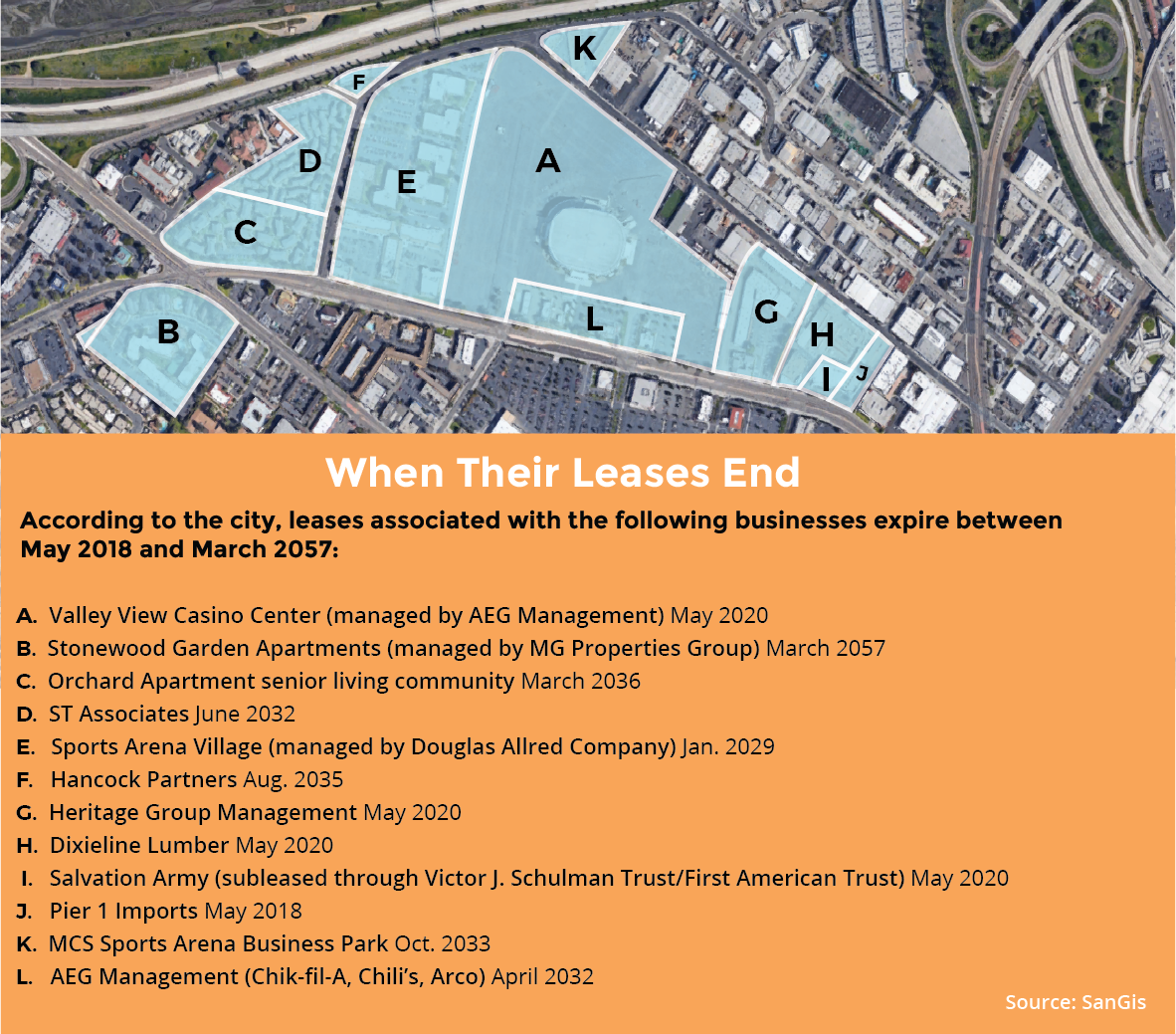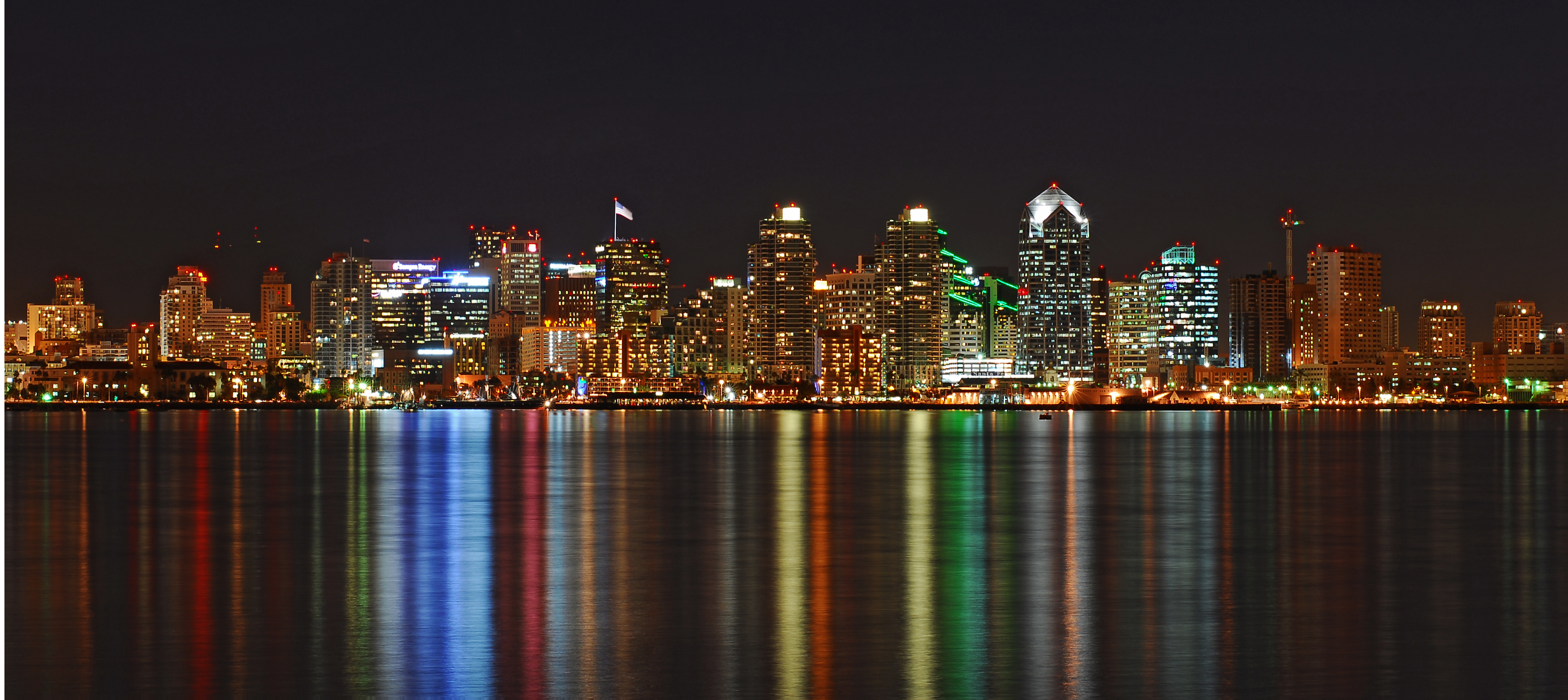The city of San Diego owns many acres of land in the Midway District and it appears to be reluctant to extend leases around the Valley View Casino Center, and at the arena itself, beyond 2020. City planners are also finalizing new zoning rules for the area. It’s all heading toward a major redevelopment of the area.
City officials are clearing the way for a massive redevelopment of the land around the Valley View Casino Center.
City planners expect to finish a new community plan for the Midway District by this summer. That plan could increase the neighborhood’s population by nearly six times what it is now and increase jobs by 28 percent.
At the same time, the city is not extending leases beyond May 2020 for some of the businesses that occupy city-owned land in the area, including AEG Management, which manages the Valley View Casino Center.
That could open up nearly 43 acres of city-owned land for private development.
The city owns not only the old arena and parking lot but much of the land under businesses like Pier 1 Imports. If the city doesn’t extend their leases beyond 2020 — including the big one to operate the arena — the stage will be set for a major redevelopment of the entire area, perhaps orchestrated by one developer after a city bidding process.

The city owns nearly 100 acres it leases to various businesses in the Midway District. Many of those leases, including the one for the Valley View Casino Center, are scheduled to expire in 2020, potentially making way for a city-led redevelopment effort.
At the same time, someone is polling voters on what type of development they would support in the area. The arena opened in 1966, before San Diego voters passed a restriction on how high buildings could be west of Interstate 5.
Now, to build a new arena of the same height or higher, voters would have to sign off on the plan.
In addition to being the home of the San Diego Gulls, Valley View hosts a variety of concerts and other events throughout the year. Every weekend, Kobey’s Swap Meet, an outdoor flea market, takes place in the Center’s parking lot.
In a recent interview with the Independent Voter Network, Ernie Hahn, the longtime general manager of the arena, said he and AEG Management want a five-to-seven-year extension on the lease. He said he was not part of any group surveying voters on the future of the land.
The Gulls began playing at the Valley View Casino Center in 2015, but are the sixth professional hockey team to play there, beginning with the original San Diego Gulls in 1966.
But, with the Gulls venue’s lease expiring in less than two and a half years, questions about the AHL team’s future in San Diego are hard to ignore.
Gulls Communications Manager Steve Brown would not answer questions about the expiration of Valley View Center’s lease and what it means for the hockey team but in an email said, “the organization does not have any comments on the potential of a new arena.”
Yes, talk of a new arena is real.
This month, language has been circulating about a potential ballot initiative to replace the Valley View Casino Center. The survey is being conducted by Competitive Edge Research and Communication, and reads:
“Shall the city approve a privately-funded project which replaces the current sports arena with a new, modern arena; includes mixed-use commercial, retail and residential housing on the 120-acre city-owned site; is consistent with the community plan except that it requires an exemption from the 30-foot building height limit so the maximum height of any building at the site cannot exceed the 75-foot height of the current sports arena; and includes infrastructure improvements.”
Competitive Edge’s John Nienstedt would not say who the client of the survey is. Calls and emails to AEG Management were not returned.
In an email, city of San Diego Communications Director Katie Keach said, the Competitive Edge survey is not a city effort.
According to Cybele Thompson, director of city of San Diego Real Estate Assets, “the city has had no discussions with any developers about this site” and “no final decisions have been made about the Sports Arena site or when any RFPs would be issued.”
But, Thompson said “developers are extremely interested in the sites that end in 2020, which present a very attractive contiguous site.”
The land the businesses with leases expiring in 2020 occupy make up almost half of the city-owned land in the area. The other 44.47 acres of city-owned land is occupied by businesses or residential properties with leases expiring between May 2018 and March 2057.
In an email, Thompson, said “it has not yet been determined” if leases expiring after 2020 will be extended any further. Pier 1 Imports occupies the land with the lease expiring in May. According to Thompson, the lease could have been extended to May 2020, but the company was not interested.
“The city has no right to ‘force’ lessees with later dates to do anything, nor would it make financial sense to attempt an earlier buyout,” Thompson said in an email. “Sites which are already developed as residential will likely remain that for many years to come.”
In recent lobbying firm registrations with the city of San Diego, the law firm Sheppard, Mullin Richter and Hampton registered with the city on behalf of clients, including H&S Ventures, LLC, the San Diego Gulls owner.
According to the registration, the H&S Ventures interest is with the “Midway-Pacific Highway Community Plan Update located at 3500 Sports Arena Blvd.” That’s the Valley View Casino Center’s address. Specifically, according to the lobbying registration, the Gulls Owner would like to see the plan approved “with increased residential density.”
According to the city, there are currently 1,935 residential units and 4,600 residents in the area. The proposed plan would allow up to 11,585 residential units and 27,075 residents.
Vickie White, senior planner for the city of San Diego, said, the goals of the community plan are to identify villages and districts that provide more distinct community character, provide additional recreational opportunities and to support the community as a commercial and business district. In order to allow for more residential units, the plan would change some of the zoning in the area.
The city is currently accepting public comment on the draft Environmental Impact Review of the community plan. Next the city will review the comments and develop responses followed by a public hearing process. The final step will be to send it to City Council for approval.
White said the city hopes to have the process wrapped up this summer.
The approval of the community plan and what happens next with the city-owned land are two separate processes. The City Council would approve any new leases that would move forward but the public would not need to sign-off on any development in the area, including with the city-owned land, unless a developer wanted to build outside of what is currently approved in the area, like building height requirements.
[divider] [/divider]





